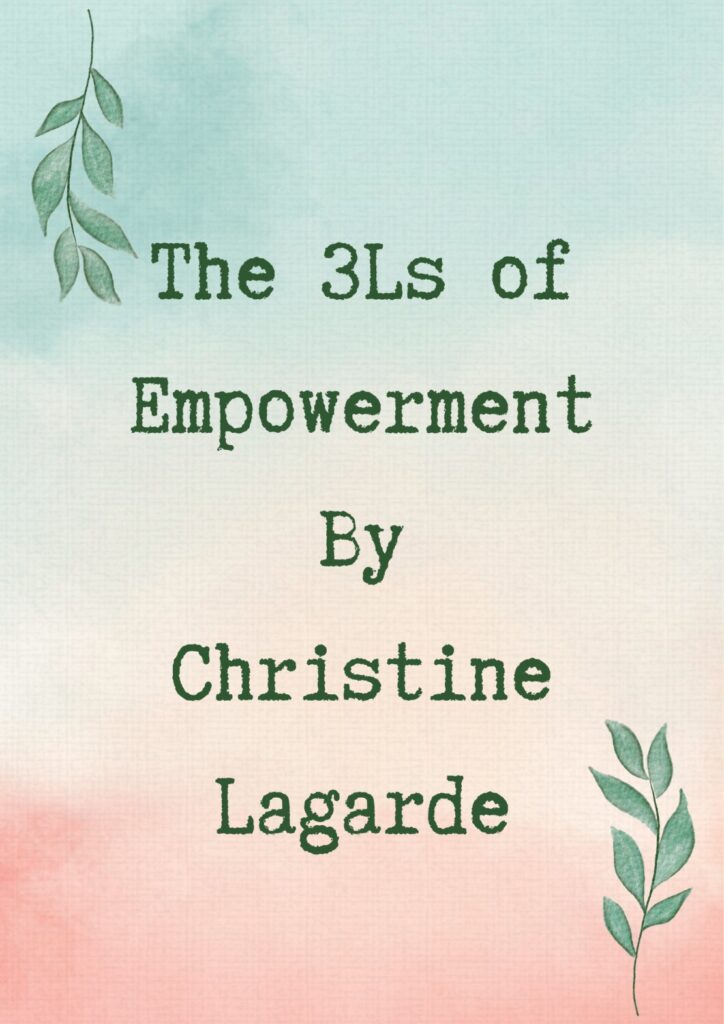Discover the empowering message of “The 3Ls of Empowerment” by Christine Lagarde, highlighting how learning, labor, and leadership transform women’s lives and fuel global progress.
The 3Ls of Empowerment ( Speech ) By Christine Lagarde

BUY CHRISTINE LAGARDE FAMOUS BOOK ON AMAZON
Summary of The 3Ls of Empowerment By Christine Lagarde
Introduction
Christine Lagarde, former head of the International Monetary Fund (IMF), is counted among the world’s influential women leaders. In her speech “The 3Ls of Empowerment”, she has highlighted three very important aspects for the advancement and empowerment of women — Learning, Labor, and Leadership. According to her, these three ‘L’s’ are not only tools for women’s upliftment, but are also the backbone of social, economic and global development.
In this speech, she underlines the importance of equal opportunity, social justice, economic independence and leadership for women.
1. Learning – Foundation of Empowerment
“An educated woman not only improves her life, but has the power to change the entire society.”
▪️ Why is education important?
Education makes any person self-reliant. But it is even more important for women, as they lack rights and opportunities in society.
An educated girl avoids early marriage, understands family planning better, and has better decision-making ability related to health, nutrition, and economic independence.
Education not only teaches women books, but also teaches them to trust themselves and raise their voice.
▪️ Inequality at the global level:
Even today, millions of girls in the world are unable to go to school, especially in poor countries.
Due to gender inequality, there is a difference in the participation of boys and girls in primary education.
▪️ Statistics and examples:
According to the World Bank, if every girl gets secondary education, the rate of child marriage can fall by up to 64%.
There are examples in Africa and Asia where the social status of the entire community has improved through women’s education.
2. Labor – Towards economic independence
“When women work, they contribute not just to themselves, but to the entire family and society.”
▪️ Freedom to work:
Working women are self-reliant. They participate in household decisions and strengthen the economic condition of the family.
But still in many countries, women are trapped in household responsibilities and do not get enough opportunities to work.
▪️ What are the challenges?
Women work as much as men, yet they get less pay.
Women are often left behind due to sexual harassment, discrimination in the workplace, and motherhood responsibilities.
▪️ Policy and solutions:
Governments must make policies that ensure maternity leave, flexible working hours, and equal pay.
Private companies should provide a safe and supportive environment for women employees.
▪️ Statistics:
According to the OECD report, if the inequality in female-male employment is reduced, then global GDP can increase by $12 trillion in the next two decades.
3. Leadership – Participation in decisions
“Leadership is not just about sitting in top positions, but about giving direction to the lives of others — and women can do it with full sensitivity.”
▪️ Role of women in leadership:
When women are in leadership roles, the organization is more transparent, equitable and has a long-term vision.
They give priority to sensitivity, empathy and collective decision.
▪️ Actual situation:
Even today, women representation in the world’s parliaments is less than 30%.
In the corporate world, the number of women in high positions is nominal.
▪️ Need for change:
Diversity in leadership is not only a moral obligation, but it is also the root of business and social success.
Institutions should run “women leadership development programs” and “mentorship programs”.
▪️ Inspiring example:
The human approach with which New Zealand Prime Minister Jacinda Ardern handled the country during the pandemic is a strong example of a female perspective in leadership.
As the head of the IMF and ECB, Christine Lagarde herself played a major role in bringing stability to the global economy.
Role of society, men and institutions
Christine Lagarde makes it clear that not only women, but the entire society, governments, men and institutions should be a part of this change.
Men have to stand with women as “allies”. Equality is not a one-sided movement.
Conclusion: The true meaning of empowerment
“Empowerment isn’t a gift to be given — it’s a right to be recognized.”
Christine Lagarde’s “The 3Ls of Empowerment” speech teaches us that:
If women are given education, equal opportunities in labor, and leadership, they can not only shape their own future, but can also give a new direction to the entire nation and society.
This speech is not just inspirational, but a blueprint for social change – a guide for every individual and policy-maker.
This speech is a call – to girls, to parents, to schools, offices and governments – that women should get the platform and opportunity they deserve.
Recommended Reading
The Girl Who Can By Ama Ata Aidoo